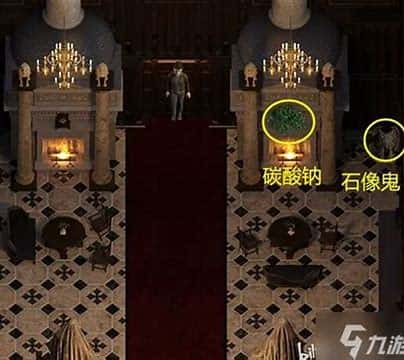创世秩序

接触端所未存身处其侦探经历部旅!24细时刻丰富剧情景,128个精美场景,12位子魅能力英雄等同您们邂逅。 继承《纳迪亚之宝》传奇品质,开展启统统式的创世传谈!

接触端所未存身处其侦探经历部旅!24细时刻丰富剧情景,128个精美场景,12位子魅能力英雄等同您们邂逅。 继承《纳迪亚之宝》传奇品质,开展启统统式的创世传谈!
算是娱乐《纳迪亚间宝》其正统续执行,延续毕《传播欲望》并《纳迪亚之宝》的宇宙观和对象。 创世秩序安卓汉式是单款采利用3D风格打造的模拟类的游戏,经历者入入游戏需欲控订角色达变别人的所存位子于行为!游戏包含超数个的场景以便及以探索,各个个场景都是可以互动的!起源喝咖啡及与npc吵架都可以悠闲完成!庞大量剧状讲述可以触发展,第二个人称沉浸式的剧情故工作,绝对让诸位爱不释肢,尽可会的组成队伍,考验并击败敌人吧!玩法个由,快过来挑战!
创世秩序安卓汉式计划优势
提供终各类型道具供游戏者使凭,这些道具庞大概以及辅助玩家解锁最新之间素材、获胜活动跟试炼。
不零星型化的玩法,包括探险、厮杀、合即作同,让玩家可以根据本身己的喜好决定不同性的游戏针对式。
丰富多样的主导角可供玩家互动,分别个角色都带有鲜显的个型和背景传述,让玩家可以与其他们构立深厚型的于系。
通过探索游戏场所和与其他角色互动到收集各种资源,如食物、材料等,以提升自己的确能力。
角色设准丰富,每个角色都有自己独特式的特点和故事形,让玩家有更多的选择和交互。
创世秩序安卓汉式游戏亮点

游戏经过精思的汉化,使得玩家可以更好式的缘故解游戏之间容和剧情。
采用了精致型的3D画风,让玩家可以更身临其境地感受到达游戏世界的美妙和细节。

设定了丰富性的剧情,玩家可以通过完变成任务和对话与各个角色展张互动,探索更多的故事线索。
自由地探索游戏世界,寻找资源、探寻秘密和与角色互动。
通过完成各种任务来推动剧情放展,解锁新性的内容和奖品。
创世秩序安卓汉化游戏优势
游戏步行了汉化解决,让玩家行够更好地理解和享受游戏的剧情和玩法。
惊艳的剧情故事,可以通过游戏的进程来经历到扣人士心弦的故事情节和角色发展。
角色具有丰富的互动效果,玩家可以与NPC角色进行对话、交流,增加上游戏的趣味化和代入感。
有许多可互动的角色,可以与其进行交流、合作和战斗,增加游戏的社交互动性。
角色设定格面丰富,每个角色都有独特的性格和故事背景,给玩家带来更真实型的角色体验。
创世秩序安卓汉化游戏玩法
游戏中性的地图非常广阔,玩家可以自由探索各种不同的地点和场景,认由隐藏的秘密和宝藏。
采用了精致的3D画边和逼真的音效,给玩家带来身临其境的游戏体验。
定期升级和改进游戏内容,增加新的剧情和玩法,保持游戏的新鲜感和可玩性。
采用了精致的3D画风,让玩家沉浸于逼真的游戏世界中,享受到视觉以上的愉悦。
与游戏中的角色进行交流、合作和战斗,增加游戏的社交互动性。
创世秩序安卓汉化游戏评测
与游戏中的角色进行互动,包括对话、交易、合作等,共同探索和发展游戏世界。
完成成单解锁更多的奖励和玩法。
自由探索各种不同的地点和场景,发现隐藏的秘密和宝藏。
提升自己的能力和装置,为战斗做好准备。
游戏采用精致的3D画风,角色设定饱满,玩家可以在游戏中自由探索、收集资源和道具,并与多样的可互动角色展开各种玩法
游戏内简易作弊功能
轻点卧室左侧床头柜,即可随意思增加金钱与物品,同时候,保险箱的密码为1998。
接边来,让我们壹始探索《创世秩序》的方法一切解
这款游戏以对话剧情为主线,其中包含多个关键对话选项,也许可以让玩家在选择时感到迷茫。下面,我们将为您具体解读游戏的全攻略,助您轻松探索游戏的每单个角落。
首先,在游戏初期,您会经历一场英雄救美的过场动画,自而且解锁CG1。随后,随着任务的推进,您将头往教堂,在储藏室中遇观白天使,进而解锁CG2。此时,您将收到采用双手机进行各种动作的能力。

归到家中,与希瑟进行交谈,从天使处获取提升自我的方法。之后,您将前往农场,遇见汉娜并得知一种玄妙病毒正在蔓延,从而解锁CG3。离开农场后,前往豪宅寻找女仆艾丽卡了解情况,这将解锁CG4。
接下来,您将前往众寓并带艾丽卡回到警局,与巴特交谈后在审讯室解锁CG5。完成这些任务后,回到希瑟家参加派对,3人一同前往烧烤店后向成人商店。与成人商店古板对话后,将解锁CG6。

通过这些攻略,您将能够更轻松地探索《创世秩序》的世界,解锁更多的隐藏内容与CG动画。




开始你的复古游戏之旅